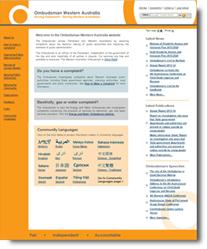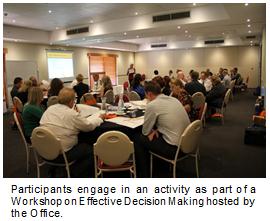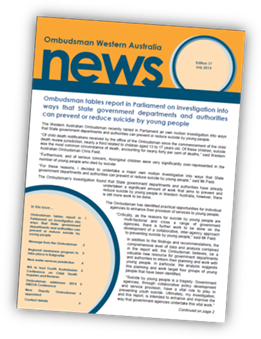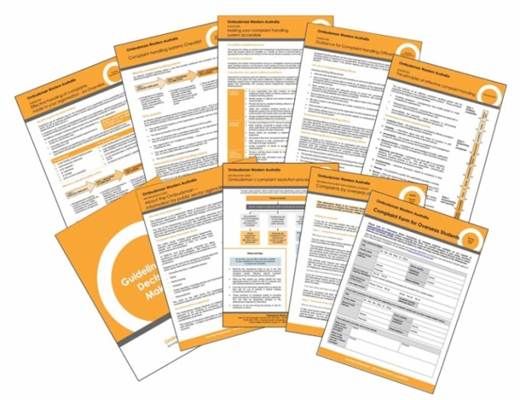Collaboration and Access to Services
Engagement with key stakeholders is essential to the Office’s achievement of the most efficient and effective outcomes. The Office does this through:
- Working collaboratively with other integrity and accountability bodies – locally, nationally and internationally – to encourage best practice, efficiency and leadership;
- Ensuring ongoing accountability to Parliament as well as accessibility to its services for public authorities and the community; and
- Developing, maintaining and supporting relationships with public authorities and community groups.
Working Collaboratively
The Office works collaboratively with local, national and international integrity and accountability bodies to promote best practice, efficiency and leadership. Working collaboratively also provides an opportunity for the Office to benchmark its performance and stakeholder communication activities against other similar agencies, and to identify areas for improvement through the experiences of others.
|
Members: |
Background: The Integrity Coordinating Group (ICG) was formed to promote and strengthen integrity in Western Australian public bodies. The Office’s involvement: 2014-15 initiatives: The ICG met four times in 2014-15. The Office was involved in the ICG’s graduate program, which involves a graduate working in each of the member agencies over a two year period in total. |
Public Sector Commission’s Induction: Your Guide to Ethics and Integrity in the Public Sector Program
|
Background: As part of the induction process for all new public officers, the Public Sector Commission holds a half-day module on ethics and integrity in the public sector. The sessions are available to all new public officers. Staff from the Public Sector Commission, the office of the Ombudsman, the Corruption and Crime Commission and the Office of the Information Commissioner present at these sessions. 2014-15 initiatives: The Office presented on five occasions during the year. The Office provides information to new public sector employees on The Role of the Ombudsman and how the Office may be able to assist them in their work. This program will continue into 2015-16. |
International Ombudsman Institute |
Background: The International Ombudsman Institute (IOI), established in 1978, is the only global organisation for the cooperation of more than 170 Ombudsman institutions. The Office’s involvement: The Office is a member of the IOI. The Ombudsman was elected to the position of IOI Treasurer and as a member of the Executive Committee of the Board of Directors of the IOI in March 2014. The Ombudsman previously served as the President of the Australasian and Pacific Ombudsman Region (APOR) of the IOI from November 2012 until March 2014.
The Ombudsman attended the International Ombudsman Institute Executive Committee meeting on 26 October, followed by the International Ombudsman Institute Board meeting on 27-29 October 2014. |
Information sharing with Ombudsmen from other jurisdictions |
Background: Where appropriate, the Office shares information and insights about its work with Ombudsmen from other jurisdictions, as well as with other accountability and integrity bodies. 2014-15 initiatives: The Office exchanged information with a number of Parliamentary Ombudsmen and industry-based Ombudsmen during the year. |
Australia and New Zealand Ombudsman Association Members: Parliamentary and industry-based Ombudsmen from Australia and New Zealand
|
Background: The Office’s involvement: The Office is a member of ANZOA. The Office periodically provides general updates on its activities and also has nominated representatives who participate in interest groups in the areas of public relations, first contact teams, business improvement and communications. 2014-15 initiatives: |
Indonesian/ Australian Ombudsman Linkages and Strengthening Program Members: Western Australian Ombudsman Commonwealth Ombudsman New South Wales Ombudsman Ombudsman Republik Indonesia |
Background: The Indonesian/Australian Ombudsman Linkages and Strengthening Program (Program) aims to provide greater access across Indonesia to more effective and sustainable Ombudsman services. The Office’s involvement: The Office has been involved with the Program since 2005 and supports the Program through staff placements in Indonesia and Australia. 2014-15 initiatives: In December 2014, the Ombudsman hosted two staff from the Ombudsman Republik Indonesia for a one week internship. The interns met with senior Ombudsman staff and received training in the Office’s complaint handling processes. |
Ombudsman co-hosts the 4th Australasian Conference on Child Death Inquiries and Reviews
In November 2014, the Office co-hosted the 4th Australasian Conference on Child Death Inquiries and Reviews with the Department for Child Protection and Family Support. This important biennial conference, hosted for the first time in Western Australia, brought together a diverse range of professionals responsible for conducting reviews of child deaths, serious child injuries and family and domestic violence fatalities.
Further details about the Conference are in the Child Death Review section, and copies of the Conference presentations are available on the Ombudsman’s website.
Providing Access to the Community
Communicating with complainants
The Office provides a range of information and services to assist specific groups, and the public more generally, to understand the role of the Ombudsman and the complaint process. Many people find the Office’s enquiry service and complaint clinics held during regional visits assist them to make their complaint. Other initiatives in 2014-15 include:
- Regular updating and simplification of the Ombudsman’s publications and website to provide easy access to information for people wishing to make a complaint and those undertaking the complaint process; and
- Ongoing promotion of the role of the Office and the type of complaints the Office handles through ‘Ask the Ombudsman’ on 6PR’s Nightline Program.
Access to the Ombudsman’s services
The Office continues to implement a number of strategies to ensure its complaint services are accessible to all Western Australians. These include access through online facilities as well as more traditional approaches by letter and through visits to the Office. The Office also holds complaints clinics and delivers presentations to community groups, particularly through the Regional Awareness and Accessibility Program. Initiatives to make services accessible include:
- Access to the Office through a toll free number for country callers;
- Access to the Office through email and online services. The importance of email and online access is demonstrated by its further increased use this year from 61% to 65% of all complaints received;
- Information on how to make a complaint to the Ombudsman is available in 15 languages and features on the homepage of the Ombudsman’s website. People may also contact the Office with the assistance of an interpreter by using the Translating and Interpreting Service;
- The Office’s accommodation, building and facilities provide access for people with disabilities, including lifts that accommodate wheelchairs and feature braille on the access buttons and people with hearing and speech impairments can contact the Office using the National Relay Service;
- The Office’s Regional Awareness and Accessibility Program targets awareness and accessibility for regional and Aboriginal Western Australians as well as children and young people;
- The Office attends events to raise community awareness of, and access to, its service, such as the Financial Counsellors’ Association conference in
October 2014, and Homeless Connect in November 2014; and - The Office’s visits to adult prisons and juvenile custodial facilities provide an opportunity for adults and young people detained in custody to meet with representatives of the Office and lodge complaints in person.
Ombudsman website
 The Ombudsman’s website provides a wide range of information and resources for:
The Ombudsman’s website provides a wide range of information and resources for:
- Members of the public on the complaint handling services provided by the Office as well as links to other complaint bodies for issues outside the Ombudsman’s jurisdiction;
- Public authorities on decision making, complaint handling and conducting investigations;
- Access to the Ombudsman’s investigation reports such as the Investigation into ways that State Government departments and authorities can prevent or reduce suicide by young people;
- The latest news on events and collaborative initiatives such as the Regional Awareness and Accessibility Program; and
- Links to other key functions undertaken by the Office such as the Energy and Water Ombudsman website and other related bodies including other Ombudsmen and other Western Australian accountability agencies.
The website continues to be a valuable resource for the community and public sector as shown by the increased use of the website this year. In 2014-15:
- The total number of visits to the website has increased by 11% to 80,445 page visits compared to 72,363 page visits in 2013-14.
- The top two most visited pages (besides the homepage and the Contact Us page) on the site were ‘The role of the Ombudsman’ and ‘How to make a complaint’; and
- The Office’s Guidelines on Complaint Handling, and Procedural Fairness Guidelineswere the two most viewed documents.
The website content and functionality are continually reviewed and improved to ensure there is maximum accessibility to all members of the diverse Western Australian community. The site provides information in a wide range of community languages and is accessible to people with disabilities.
‘Ask the Ombudsman’ on Nightline
The Office continues to provide access to its services through the Ombudsman’s regular appearances on Radio 6PR’s Nightline program. Listeners who have complaints about public authorities or want to make enquiries have the opportunity to call in and speak with the Ombudsman live on air. The segment allows the public to communicate a range of concerns with the Ombudsman. The segment also allows the Office to communicate key messages about the State Ombudsman and Energy and Water Ombudsman jurisdictions, the outcomes that can be achieved for members of the public and how public administration can be improved. The Ombudsman appeared on the ‘Ask the Ombudsman’ segment in September 2014 and February and May 2015.
Regional Awareness and Accessibility Program
The Office continued the Regional Awareness and Accessibility Program (the Program) during 2014-15. Two regional visits were conducted, to Kalgoorlie-Boulder in July 2014 and Northam in May 2015, including such activities as:
- A seminar for regionally-based public authorities to discuss good administrative practice, effective complaint resolution and appropriate access to information;
- Complaints clinics, which provided an opportunity for members of the local community to raise their concerns face-to-face with the staff of the Office. The Office resolved many of the complaints made during the time of the visits;
- Meetings with Aboriginal community members to discuss government service delivery and where the Office may be able to assist;
- Training and workshops for regionally-based public authorities;
- Meetings and liaison with community service organisations, to provide information about the Office’s services; and
- Meetings with community youth groups and a Youth Council.
The Program is an important way for the Office to raise awareness of, access to, and use of, its services for regional and Aboriginal Western Australians. While the Program is coordinated by the Office, the Office collaborates with other integrity and accountability agencies including the Health and Disability Services Complaints Office, the Office of the Information Commissioner, the Commissioner for Victims of Crime, and the Commonwealth Ombudsman’s office.

The Program enables the Office to:
- Deliver key services directly to regional communities, particularly through complaints clinics;
- Increase awareness and accessibility among regional and Aboriginal Western Australians (who were historically under-represented in complaints to the Office); and
- Deliver key messages about the Office’s work and services.
The Program also provides a valuable opportunity for staff to strengthen their understanding of the issues affecting people in regional and Aboriginal communities.
The collaboration with other integrity and accountability agencies during regional visits and complaints clinics also assists in ensuring regional and Aboriginal Western Australians can be easily referred to the most appropriate body to assist them.
Speeches and Presentations
The Ombudsman and other staff delivered speeches and presentations throughout the year at local, national and international conferences and events.
Ombudsman’s speeches and presentations
- Chaired the closing session of the 2014 Australian Institute of Administrative Law National Administrative Law Conference Innovations in Administrative Law and Decision-Making in July 2014;
- The Role of the Ombudsmanto University of Western Australia Administrative Law Students in October 2014;
- Introductory address of the 4th Australasian Conference on Child Death Inquiries and Reviews in November 2014;
- The Role of the Ombudsman to Edith Cowan University Administrative Law Students in March 2015;
- The Role of the Ombudsman in Good Decision Making to the Legalwise Decision Making Principles and Good Practice Seminar in March 2015; and
- The Role and Function of the Ombudsman to the Department of Corrective Services Senior Leadership Team in March 2015.
Speeches by the Ombudsman are available on the Ombudsman’s website.
Speeches and presentations by other staff
- Presentations on the Ombudsman’s report, Investigation into ways that State Government departments and authorities can prevent or reduce suicide by young people to a range of government agencies and non-government organisations – for further details see the Own Motion Investigations and Administrative Improvement section;
- The Role of the Ombudsman to the Public Sector Management Program in July 2014;
- The Role of the Ombudsman to Curtin University staff in October 2014;
- Reforming Complaint Resolution – Achieving Improved Timeliness and Effectiveness to the National Investigation Symposium in Sydney in
November 2014; - The Role of the Ombudsman to Prison Superintendents at the Adult Justice Services Senior Managers Meeting in March 2015;
- Good Decision Making and Effective Complaint Handling to State Government departments and local governments in the Wheatbelt Region in April 2015;
- The Role and Functions of the Ombudsman to senior staff at the Department of Education in June 2015; and
- The Role and Functions of the Ombudsman to staff at Acacia Prison in June 2015.
Staff of the Office also regularly present on the role of the Ombudsman at the Public Sector Commission’s Induction to the Western Australian Public Sector seminars for public sector employees.
Liaison with Public Authorities
Liaison relating to complaint resolution
The Office liaised with a range of other public authorities in 2014-15, including:
- The Department of Corrective Services;
- The Office of the Inspector of Custodial Services;
- The Corruption and Crime Commission;
- The Department of Housing;
- The Department of Transport;
- The Department of Education;
- The Department for Child Protection and Family Support;
- Western Australia Police;
- Various universities; and
- Various local governments.
Liaison relating to reviews and own motion investigations
- The Office undertook a range of liaison activities in relation to its reviews of child deaths and family and domestic violence fatalities and its own motion investigations.
See further details in the Child Death Review section, the Family and Domestic Violence Fatality Review section, and Own Motion Investigations section.
Publications
Western Australian Ombudsman newsletter
 The Western Australian Ombudsman Newsletter, issued in July 2014, is a key publication used by the Office to communicate information to its stakeholders about the Office’s performance, achievements, events and resources.
The Western Australian Ombudsman Newsletter, issued in July 2014, is a key publication used by the Office to communicate information to its stakeholders about the Office’s performance, achievements, events and resources.
The newsletter is distributed electronically to Members of Parliament, public authorities and interested members of the public. The newsletter is published on the website after it is issued.
Guidelines and information sheets
The Office has a comprehensive range of publications about the role of the Ombudsman to assist complainants and public authorities, which are available on the Ombudsman’s website. For a full listing of the Office’s publications, see Appendix 3.

Go to next section of the Annual Report 2014-15 >>
Go to next section of the Annual Report 2014-15 >>
Go to previous section of the Annual Report 2014-15>>
Go back to Annual Reports page >>
Download the Collaboration and Access to Services section as a PDF
To read a pdf, you will need Adobe Acrobat Reader, which can be downloaded
for free from Adobe at http://www.adobe.com/products/
acrobat/readstep2.html.
